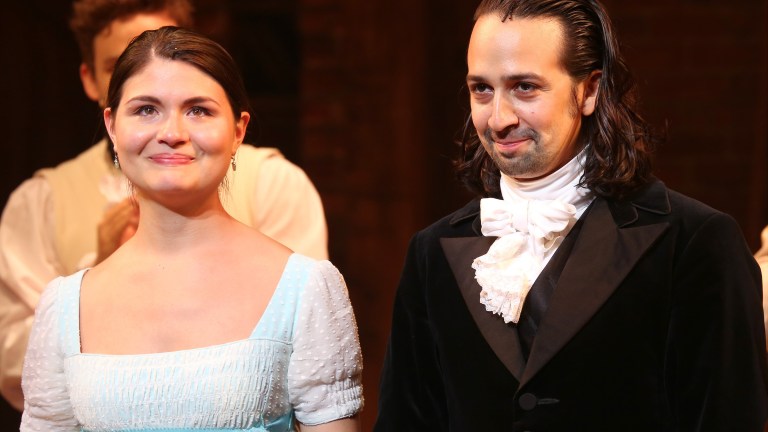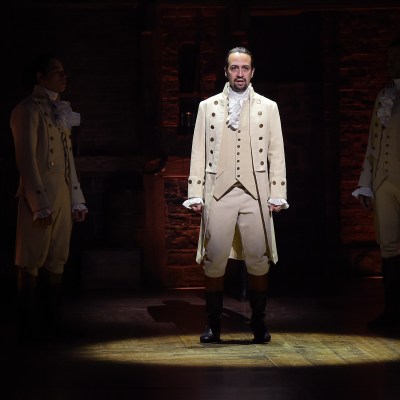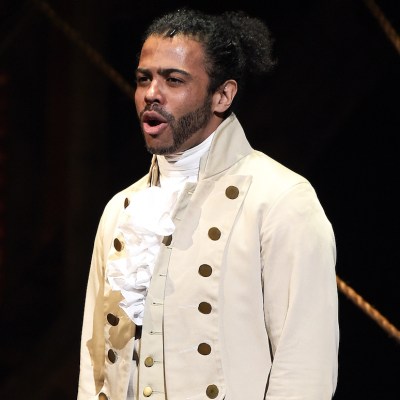Hamilton Ending Explained: Why Did Eliza Gasp?
The ending of Hamilton on Disney+ features a moment that has confounded some viewers. Why exactly does Eliza Hamilton gasp?

The ending of Lin-Manuel Miranda’s epic American history musical, Hamilton, is easy enough to understand. As any product of the American education system (or anyone familiar with the SNL Digital Short “Lazy Sunday”) can tell you, the story of Alexander Hamilton ends with his death in a duel against political rival Aaron Burr.
And that’s exactly what happens in Hamilton where the title character (who previously never shut up about not throwing away his shot) throws away his shot at the end in an act of mercy and pays dearly for it. Simple enough! There’s one area of the Hamilton ending, however, that has confounded folks since the play premiered in 2015. That confusion has only grown since the play was made available on Disney+ on July 3. In short – what is the deal with Eliza Hamilton’s (Phillipa Soo) gasp at the end of the musical?
As the very last notes of “Who Lives, Who Dies, Who Tells Your Story” fade away, Eliza seemingly breaks the fourth wall as she gazes out into the audience, and then places her hands over her heart and delivers a joyful, shocked gasp. What exactly is happening here? Though Hamilton winks at its audience several times throughout its more than two and a half hours (“everything is legal in New Jersey”), this appears to be the only time that the fourth wall fully comes crumbling down. Or does it? What is Eliza seeing that makes her react so emotionally? There are a couple of possible options.
The first option is the one that’s most in line with the themes of Hamilton itself. It’s no coincidence that the closing number of the entire show is called “Who Lives, Who Dies, Who Tells Your Story” because the lack of control over one’s own narrative is a major theme of the piece. Hamilton first hears the phrase “who lives, who dies, who tells your story” from Gen. George Washington when he delivers advice to Hamilton that he’s not as in control of his legacy as he thinks.
When Eliza is betrayed by her husband sleeping with another woman, the only response that she knows will truly affect him is to “remove (herself) from the narrative.” That’s why her solo at the musical’s conclusion is so emotional as she assures us that she’s written herself back into the story. Even Burr is aware of the importance of legacy, as his first thought upon killing Hamilton is “now I’m the villain in your history.”
It’s entirely possible, and perhaps even likely then, that Eliza’s gasp is at the realization that her and her husband’s story is actually getting told. She’s momentarily aware that she’s in the Richard Rodgers Theatre near Times Square, and hundreds of audience members are dabbing their eyes at her tale. Hamilton says that a legacy is planting seeds in a garden that you’ll never get to see. And yet here Eliza is gazing upon those beautiful flowers.
Another possible interpretation of Eliza’s gasp is that she is ascending to heaven to be with her departed husband and is taken aback by the majesty of the afterlife. Remember that it is the deceased Alexander Hamilton at play’s end who says “hello” to his wife and then encourages her to look out at the audience. How could Eliza be able to see her dead husband unless she too was dead? The simple answer there is that this is theater, baby. Anything can happen. In his ghostly state, Hamilton could be operating as an Our Town-style Stage Manager figure who is now able to see through the bonds of both time and fiction.
All of these explanations are getting a tad bit technical now, however. What’s important to understand is that the ultimate reason for Eliza’s gasp is designed to be unclear in the first place. Theater, particularly musical theater, is a highly-stylized, thoroughly emotional endeavor. Is Eliza gasping because she realizes Hamilton’s legacy is secure? Because she’s gone to heaven and discovered real beauty? Because she’s at the end of a grueling 150-minute musical and is relieved? The answer to all of these questions is: sure, why not.
To be clear, “sure, why not – all of the above” is basically the interpretation that both Soo and Miranda prefer. The concept of #ElizaGasp has been a part of the show since the very beginning and as such, both Soo and Miranda have been asked about it before. In a 2016 interview with AOL about the subject, Soo said:
“People are like, ‘Is it Eliza going into heaven? Is she seeing Alexander? Is she seeing God? What is it?’ And it’s kind of all of those things. Sometimes, it’s literally, I look out and I see the audience, and that’s what it is, but I think that idea of ‘transcendence’ is present in all of that.”
More recently, Miranda shared his own perspective with in a Wired-hosted chat with fans, saying:
“I wish I could give you a simple answer. But that would be like telling you where Godot had been the whole time they were waiting for Godot. I think it’s different for each Eliza. It’s heart-stopping, isn’t it? I do think that it traverses time in some way. Whether that thing she’s seeing is Hamilton, whether that thing she’s seeing is heaven, or whether that thing she’s seeing is the world now. I think those are all valid and all fair. I do think she is seeing across a span of time in that moment.”
Miranda’s point that the interpretation for each actress portraying Eliza is different is an interesting one. In fact, the internet might not be talking about Eliza’s gasp if it weren’t for the sincere gusto that Soo approaches it with in the filmed Hamilton movie.
To let you behind the curtain a little bit: both myself and fellow Den of Geek Hamilton maestro David Crow saw live performances of Hamilton – me in Cleveland and David in Durham. Yet neither David nor I recall an Eliza gasp at the end of our respective performances. Surely it was there, as all the available evidence indicates that it’s always been a part of the play. It’s just hard to imagine anyone embracing it with as much gusto as Phillipa Soo.
In the end, perhaps the real mystery isn’t why Eliza gasps at the end of Hamilton… it’s how Phillipa Soo makes it so damn memorable.


